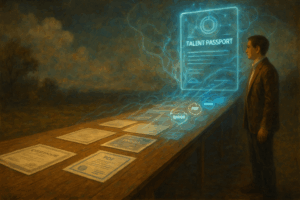What Counts as Experience in TalentPass?
Work, School, Volunteering, Life — It All Matters**
One of the most surprising things users discover is that TalentPass recognizes a much broader range of experience than a traditional resume ever would.
That’s because TalentPass is built around your real strengths and lived abilities — not just job titles.
So if you’ve ever wondered:
- “Does this count?”
- “Does my school project matter?”
- “Is this too small to include?”
- “Does it need to be paid?”
…the answer is almost always yes — it counts.
This FAQ explains exactly what you can include in TalentPass and why your real-life moments can be some of the strongest parts of your profile.
**What Counts as Experience?
Short Answer: Anything You Did That Required Effort, Skill, or Learning**
If you did something that required:
- responsibility
- decision-making
- communication
- learning
- teamwork
- leadership
- problem-solving
- care or support
- creativity
- initiative
- technical ability
- personal growth
…it counts as an experience for TalentPass.
TalentPass is designed to capture the full picture of who you are — not just your employment history.
1. Work Experience (Paid or Unpaid)
This includes:
- part-time jobs
- full-time jobs
- internships
- seasonal work
- gig work
- freelancing
- babysitting
- yard work
- tutoring
- helping in a family business
- cash jobs
- under-the-table roles (describe the work, not the arrangement)
If you did the work, it counts.
TalentPass is not judging the formality of the job — it’s interested in what skills you used and what you learned.
2. School Experiences
Some of the strongest experiences come from school because they show collaboration, learning, pressure management, and responsibility.
Include:
- class projects
- group assignments
- presentations
- research
- labs
- capstone projects
- competitions
- leadership in school clubs
- student government
- peer mentoring
These experiences reveal both human and technical strengths.
3. Volunteering & Community Work
Many people underestimate these experiences — but employers value them highly.
Examples:
- organizing an event
- community cleanups
- church or cultural group roles
- helping at school events
- food delivery or donation drives
- mentoring kids
- coaching a team
- participating in a cause
These experiences often demonstrate some of the most important human skills: reliability, empathy, initiative, and commitment.
4. Responsibilities in Your Personal Life
This is where TalentPass really differs from a resume.
Many people develop strong skills through their personal lives, including:
- caregiving for a family member
- managing household responsibilities
- supporting siblings with schoolwork
- handling transportation or scheduling
- translating or interpreting for family
- budgeting for the household
- helping someone navigate a difficult situation
These experiences show maturity, skill, and resilience — and they absolutely count.
5. Personal Projects & Self-Directed Learning
Anything you’ve built, learned, or created on your own can be added:
- learning a programming language
- creating digital art
- starting a small Etsy or Instagram business
- building something at home
- creating a portfolio
- organizing an online community
- editing videos
- repairing equipment
- teaching yourself a tool or software
Self-led projects show initiative and motivation — two traits employers prize.
6. Team Activities & Leadership Roles
These are extremely valuable:
- sports teams
- clubs
- music groups
- debate
- robotics
- esports
- role as captain, organizer, or coordinator
Any time you led people, supported a team, or kept things moving — that’s real experience.
7. One-Time Moments of Responsibility or Problem-Solving
Not everything has to be a long-term commitment.
Sometimes your strongest examples come from a single moment, such as:
- stepping up when something went wrong
- helping someone through a challenge
- fixing a problem
- keeping a group calm under pressure
- stepping into a leadership role unexpectedly
TalentPass can extract skills from even one meaningful moment.
What Doesn’t Count?
Very little.
But here’s what we recommend not including:
- purely hypothetical tasks (things you would do)
- experiences you don’t remember well enough to describe
- confidential or sensitive situations you can’t talk about
- things you weren’t actually involved in
- work done by someone else
As long as you participated meaningfully, it counts.
Why TalentPass Accepts So Many Types of Experience
Traditional resumes only capture a narrow slice of your abilities.
TalentPass is built on a different principle:
Your real potential is revealed by what you’ve done, not just where you’ve worked.
This broader approach helps TalentPass:
- identify more skills
- show deeper strengths
- map your Talent Tree more accurately
- tailor better resumes
- prepare you for better matching in the future
- help you see your own value clearly
This is especially important for:
- early-career workers
- career changers
- people who’ve taken nontraditional paths
- people returning to the workforce
- people with community or family responsibilities
- people who gained skills outside formal jobs
Your path matters — all of it.
Final Takeaway
If you:
- did it,
- learned from it,
- put effort into it,
- supported someone,
- solved a problem,
- completed something,
- took responsibility,
- or grew through it…
…it counts as experience in TalentPass.
Add the moments that shaped you.
They matter more than you think.





